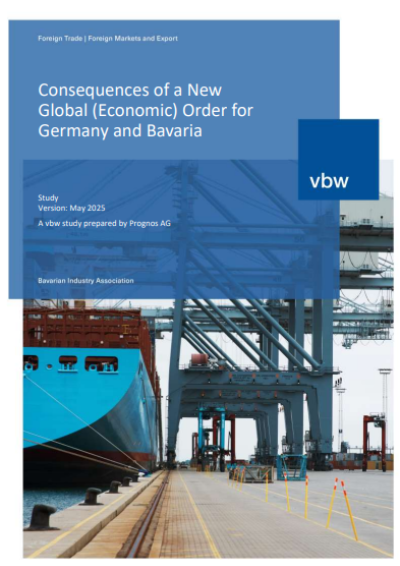Your contact
Volker Leinweber
Economics and Foreign Trade
+49 (0) 89-551 78-133 +49 (0) 173-573 89 25 Send an e-mail
study | 06/25
Consequences of a New Global (Economic) World Order for Germany and Bavaria
The vbw study examines how the global economic order is changing, what consequences this has for Europe, Germany and Bavaria and how the EU can respond to these changes.
The multilateral world trade order is beginning to crumble
The global economic importance of Western economies is declining in favor of emerging economies, which are demanding a greater say in the global economic order. In addition, geopolitical tensions are on the rise and are also putting a strain on economic cooperation. This is leading to an increasing erosion of the liberal, multilateral and rules-based global trade order under the umbrella of the WTO. US President Donald Trump's protectionist customs and trade policy is making this development even more explosive and dynamic.
Key elements and players of a new global economic order
In addition to the major economic and political players USA, China and the EU, a new global economic order will also be influenced by numerous states and groups of countries with very heterogeneous economic and political orientations, such as India, the ASEAN states, MERCOSUR and the Gulf states.
The world trade order will change into a multipolar order characterized by bilateral relations. A foreign and economic policy strongly guided by self-interest will lead to rules-based politics being increasingly replaced by power politics. Geopolitical and therefore also geo-economic rivalries are on the rise, and not just between the USA and China.
Changes in the global economic order are a burden on our economy
The shift in the global economic order away from the liberal, rules-based order has negative economic effects. This is particularly true for economies with a strong international focus, such as Germany and Bavaria. Three scenarios are considered in order to assess these effects:
- Scenario 1: increasing but not escalating geopolitical conflicts, especially between the USA and China; the EU can escape this to some extent and concludes trade agreements with other countries and regions
- Scenario 2: similar development as in scenario 1, but the EU reacts through isolationism and protectionism, national interests also gain in importance within the EU
- Scenario 3: escalation of geopolitical conflicts in which the EU is drawn into on the side of the USA
To evaluate these scenarios, it must be taken into account that around half of our Bavarian foreign trade takes place within the EU, but our most important individual trading partners are the USA and China. Scenario 3 would therefore have massive negative consequences for Bavaria and Germany. A decoupling from China would lead to a decline in our foreign trade volume of around 200 billion euros.
Conclude free trade agreements and deepen the single market
The first two scenarios show that, without an escalation of geopolitical and geo-economic conflicts, Europe has it in its own hands to cushion the negative consequences of a new global economic order. In order to compensate for losses in trade with China and the USA, the EU must conclude partnerships and trade agreements with as many countries and regions as possible and deepen the European internal market in order to promote intra-European trade and be more attractive to potential trade partners.